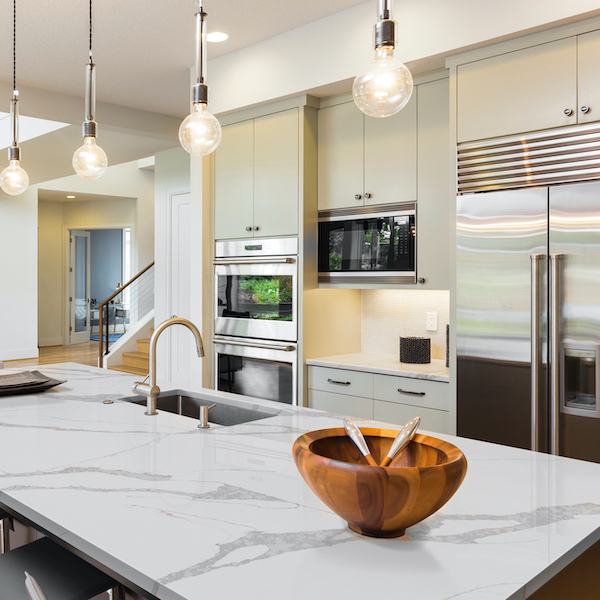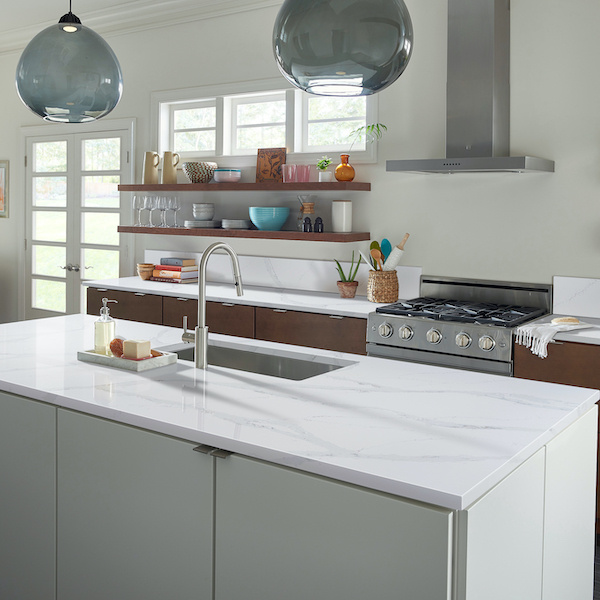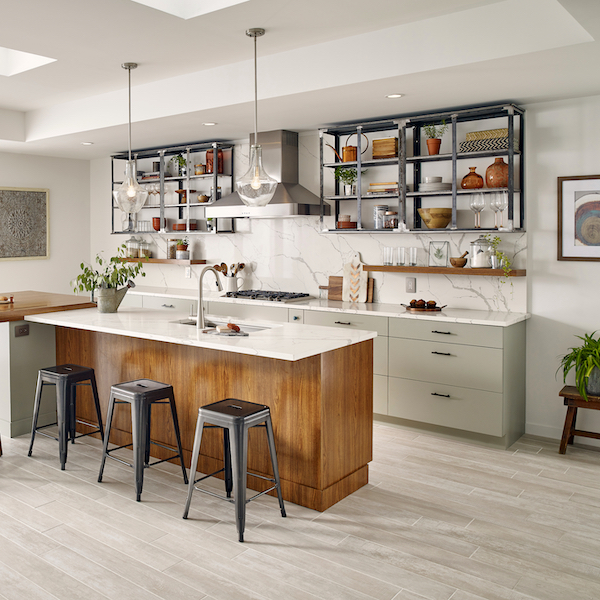Why Choose Quartz Countertops Over Marble
September 13, 2021
Marble has been widely used for kitchen countertops for over a century — as long as kitchen countertops have been in existence. They’re a mark of prestige and wealth and are undeniably beautiful. Marble countertops are not without their issues, though. Today, we have quartz countertops that offer all of the benefits with none of the drawbacks. Here’s why you should choose quartz instead.
Ease of Care
The main reason interior designers and homeowners are choosing engineered quartz over marble is its ease of care. Although it’s lovely to look at, a marble countertop isn’t exactly user-friendly. This is because marble is porous — it absorbs liquids, which means it also absorbs stains. Due to its chemical composition, it’s prone to etching damage when exposed to acidic liquids such as vinegar or lemon juice. You can apply sealer regularly to help it repel liquids and protect it from etching, but it isn’t perfect, and the sealer will need application at least once a year.
Quartz that looks like marble, on the other hand, is 100% waterproof with no extra sealing treatment required. The only care needed to maintain a quartz countertop is an occasional wipe-down with a soft cloth and mild cleanser.
Beauty
For sheer elegance, it’s hard to beat the fine white-and-gray tones of fine Italian marble or the beige and gold veining of Calacatta, with a gleaming polished finish. A marble countertop brightens a room and matches well with nearly every style of decor, from rustic to traditional or even the most contemporary kitchen design.
Quartz countertops are engineered premium surfaces, so they can be crafted to resemble a wide variety of countertop material, including all manner of natural stones. MSI’s quartz countertop colors and patterns replicate natural marble’s pure white background and graceful, contrasting veins so authentically, it would require a practiced eye to tell the difference.
Durability
Marble is well-known for its durability; in fact, there are homes built near the turn of the 20th century that still have their original marble countertops. It’s likely they show their age, though. Marble is a relatively soft material, so it is prone to damages such as scratching, chipping, cracking, staining, and etching.
Some say that these spots and scars give the countertop more character, but not everyone is fond of the well-aged look in their modern kitchen. Quartz is every bit as durable as marble — perhaps more so, considering it resists all of the damages that marble and other natural stones are prone to. A quartz countertop means you can enjoy using your kitchen, not just looking at it.
Cost
Both marble and quartz countertops are premium surfaces, and the price range for both per square foot is similar. This depends, however, on what type of marble you choose. More common types of marble, such as Carrara or Crema Marfil, are more readily available and therefore less expensive. Rarer, more exotic marble varieties such as Calacatta are rarer and, consequently, will be much more expensive. This is also true of other natural stone countertops, such as granite.
Since quartz countertops can easily be manufactured in any desired color or pattern, it makes no difference whether you choose a common, popular type of pattern or an exotic natural-stone pattern. MSI’s quartz patterns, such as Calacatta Laza or Calacatta Azai, can deliver the look of the rarest, most expensive, most opulent marble for the same price as the cheapest marble. Even more savings can be achieved with prefabricated countertops, which fit most common kitchen configurations.
Return on Investment
Ask any realtor for advice on getting the best return on investment from a home improvement project, and they will tell you to choose a kitchen remodel. Furthermore, they will suggest a granite or marble countertop for the upgrade most likely to entice potential home buyers and increase your home’s resale value. The reason for this is the countertop’s durability and versatility, coordinating with white cabinets, dark or light wood cabinets, and any color scheme.
Quartz countertops, however, have been gaining the same sort of reputation as more homeowners and designers recognize their advantages over many other types of countertops. Today, a quartz countertop delivers the same return on investment in terms of boosting resale value and buyer interest.
Sustainability
Many homeowners rank sustainability and environmental concerns as a high priority when it comes to home remodeling projects. Marble, unfortunately, has a substantial environmental impact. It is quarried from the earth, a process that requires a lot of energy, using fossil fuels to do so. It is sourced from faraway locations, such as Italy, Brazil, India, and China, which means it must be transported a long distance — again, using fossil fuels and impacting the environment.
As an engineered surface, many brands of quartz countertops are manufactured domestically in the U.S., with MSI’s quartz slabs manufactured in South Carolina. Quartz crystals are among the most abundant materials on Earth, so they are available at a minimal cost. Quartz countertops are made to last a lifetime, but it’s good to know that should you — or a future owner of your home — decide to replace the quartz countertop one day, it’s recyclable.
Conclusion The beauty of marble, along with its other positive characteristics, has drawn homeowners toward choosing it for their kitchen countertops for over a century despite its many drawbacks and labor-intensive maintenance. But, if you can have that beauty along with the same durability and return on investment without also dealing with the worry over stains and etching, why wouldn’t you? Quartz countertops offer the best of both worlds, giving you a beautiful, worry-free kitchen countertop that will last a lifetime.
More on Quartz Compared to Marble
Thinking About Marble? Consider A Quartz Countertop First!
Are Quartz Countertops Better Than Marble?
Which Is Better for Your Kitchen — Marble Or Quartz Countertops?
Are Quartz Countertops More Durable Than Marble?
.jpg)


